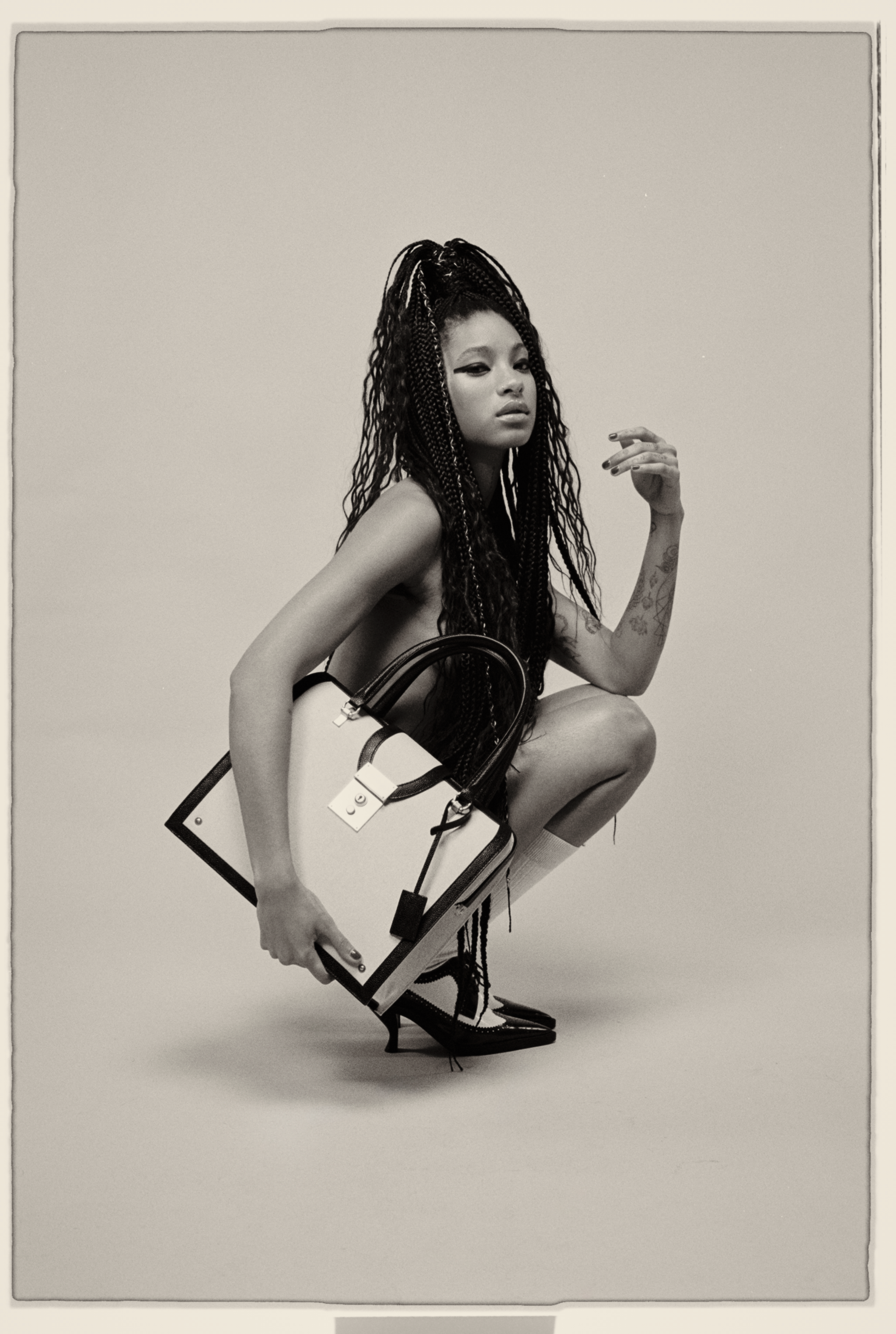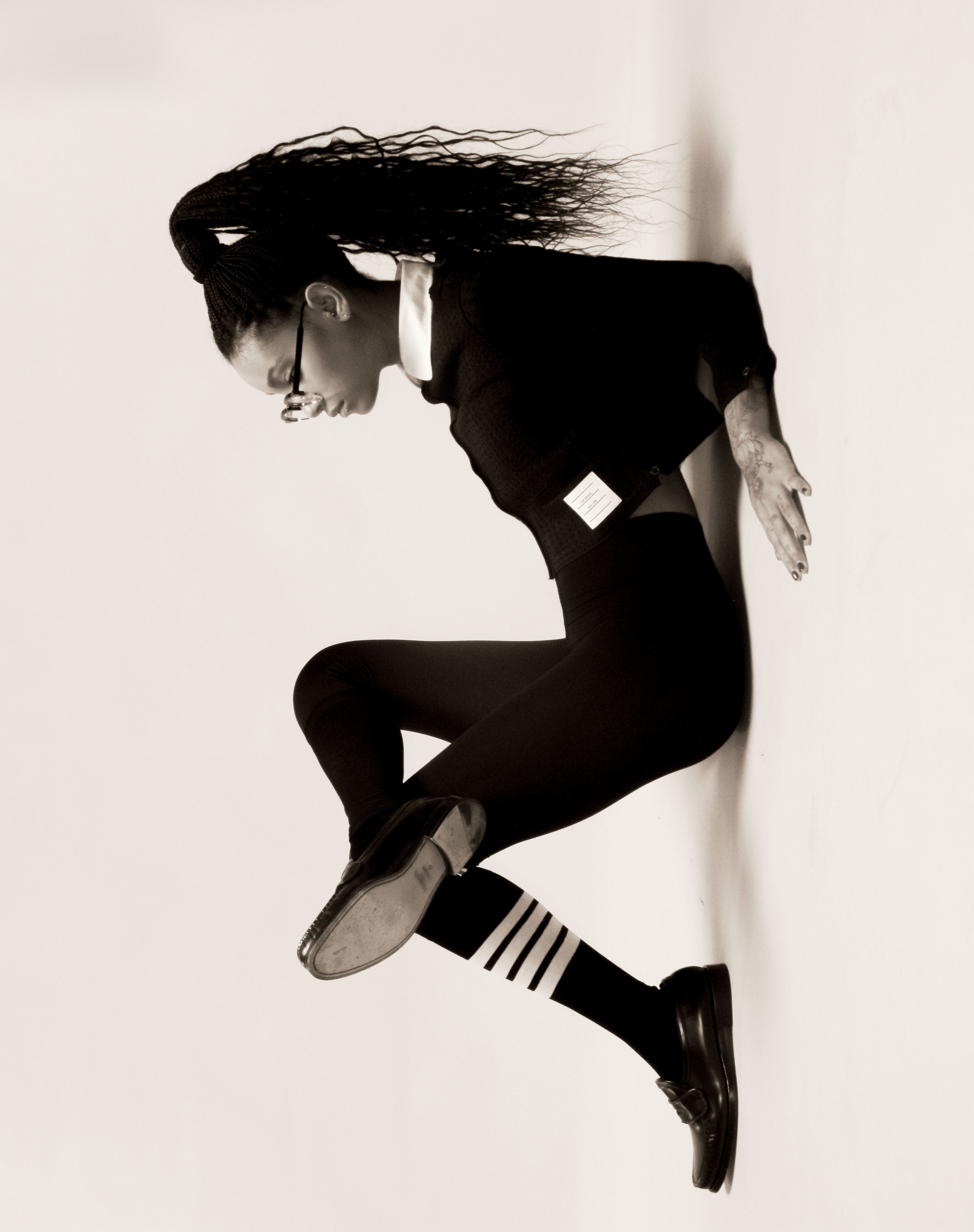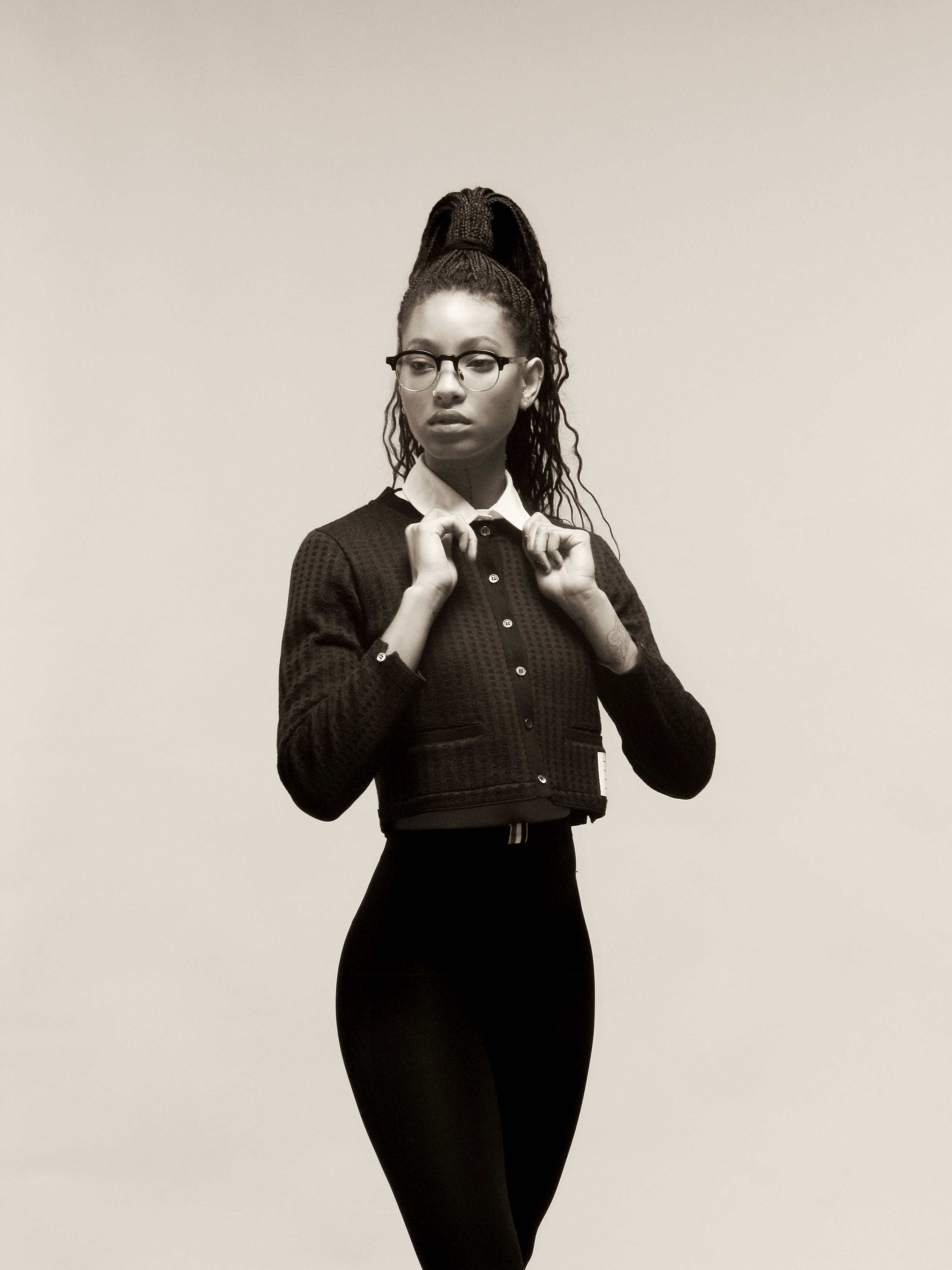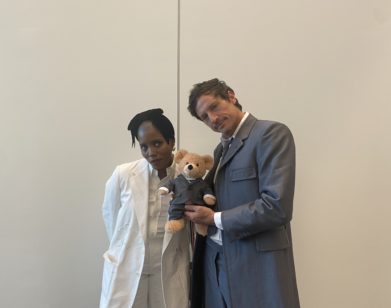STUDIO SESH
“Music Is an Act of Service”: Willow Smith, In Conversation With St. Vincent
Willow Smith is into the inexplicable things. The ethereal singer-songwriter and young prodigy has always had a rebellious spirit, but there’s a dynamic mind at work behind the star power. In her newest album, empathogen, which dropped earlier this month, she bares that soul in a raw coming-of-age story, as she explains to friend, fan, and fellow musician St. Vincent, who also just released an album of self-discovery, All Born Screaming, and who collaborated with her on the empathogen standout “pain for fun.” “You were always so self-possessed, so smart,” she tells her when they called each other up to go deep inside each other’s sonic worlds. “You’re becoming even more yourself.” In conversation, they discussed self-love, self-producing, and what it really means to be an artist.
———
ST. VINCENT: Hi, baby. Where are you? I’m in New York.
WILLOW SMITH: I’m in L.A. Damn, I was just in New York. How is it out there?
VINCENT: I’m just here for the week doing hella press, and I’m DJing a thing tonight.
SMITH: Fuck, I wish I was there. Next thing you know, I’ll fly all the way to New York just to see your DJ set.
VINCENT: I’m so fucking psyched about your new song.
SMITH: Thank you so much. I’m not gonna fangirl too hard, but I feel the exact same way. “Broken Man” is amazing.
VINCENT: I played that for you at my studio. You were like, “You should add some fuzz guitars.” And I didn’t do that.
SMITH: Wait, I told you that? That specific guitar tone that you chose was perfect. It had more of a classic feel.
VINCENT: Yeah, but I took your advice on amping it up. I was like, “I actually want it to be heavier too.” So I had Dave Grohl play on the very end of it—
SMITH: Wow!
VINCENT: And that’s where it amped up.
SMITH: Well, I’m honored. It’s not every day you get to be in the studio of one of your favorite musicians of all time. I live for that shit.
VINCENT: Thanks, my love. It was very cool to then go out to Malibu and be with your engineer and see how you work. Some people don’t have enough ideas, but you’re the opposite. You have so many ideas.
SMITH: I sometimes feel like it’s too much.
VINCENT: No, because you filter them in a cool way. You put all these disparate, interesting parts together and you make them your own. And that’s what I think a real artist is. You’re the real deal.
SMITH: “Symptom of Life” was an interesting one in the making. Piano is not usually my thing. My mom used to always say that the piano was the mother of all instruments. And with “Symptom of Life,” I kind of got awakened to the fact that I want to use this beautiful instrument more throughout the album. It’s just the simplicity of it. I surprised myself with that song. It came about in a crazy, crazy way.
VINCENT: What was the genesis of it?
SMITH: The piano riff came first, and that was actually played by my really good homie, Brad Oberhofer. I wanted the verses to be kind of staccato and broken apart in a weird way, but I wanted everything to kind of vacuum seal and come together on that really driving rhythm in the chorus. But then we had another idea, and I remember singing the bass line to my homie [Chris] Greatti. You know Greatti?
VINCENT: Yeah, yeah.
SMITH: I made a decision that we have to completely change the chorus. Sometimes I’m like, “I’ve got to learn how to play it,” but he played the shit out of that.
VINCENT: I mean, that’s what Michael Jackson did. He just sang every part like, “Here, you play this.”
SMITH: Hell yeah.
VINCENT: I’ve seen you in action, and you hear that harmony. I’ve seen you delegate that to people in real time.
SMITH: You’re making me blush. And speaking of sonic landscapes, I’ve pretty much listened to your entire discography and some of the songs on your new project might be my favorite St. Vincent songs of all time. There’s a song where it’s like a really intense synth line, and you’re talking over it.
VINCENT: Yeah, “Big Time Nothing.”
SMITH: Oh my god, bro, that shit fucking got me. I’m so interested in just how you create your sonic worlds. It sounds so different from every one of your projects I’ve ever heard.
VINCENT: I was obsessed with Patchbay. Being able to actually create the sounds in your head, because you have the technical know-how, was crucial. I mean, sound is meaning. Sound communicates so much. Songs are architecture and texture, and I really trip out on that stuff as you do, too.
SMITH: I do. When I first heard “Broken Man,” I was like, okay, I feel like from the album cover to the name, All Born Screaming, I knew where it was going. There were some psychedelic elements, but it’s also just classic rock music through your lens. And obviously when it’s through your lens, it’s going to have so many different unique and random colors to it that you wouldn’t necessarily hear in that context. You’re that kind of artist where you can’t see it coming, but I kind of pride myself in being like, “I’ve listened to so much St. Vincent, and I know…” even though I don’t. I’m just a fan. Everything tells a story.
VINCENT: You yourself are an engine, and I’ve known you since you were fourteen.
SMITH: I know.
VINCENT: You were so—
SMITH: I was pissing my pants. I was so excited to meet you.
VINCENT: But you were always so self-possessed, so smart. All of that was so clear. You just happened to be a younger person. I’m proud of you for going anywhere that your brain and heart takes you because you are so talented. You’re becoming even more yourself.
SMITH: Wow. That means so much. I think as artists, we both know how difficult it can be to step into that evolved version of ourselves, but we keep stepping into versions that are slightly and slightly closer to our core truth. Now I’m at the point where I see the work that I put in, and I just can’t wait to put more work in. I definitely have been in positions in my life where I’m like, “Damn, my vision is so much greater than my capabilities,” and I feel like now my capabilities are kind of catching up to my vision, which feels so good.
VINCENT: Totally. While making your new record, what did you learn that you weren’t expecting to learn?
SMITH: I feel like how I work with certain people is very different. When I’m working by myself, I feel like I put more stress on arrangement, but when I work with certain people, because I know what their strengths and weaknesses are, my mind focuses on different things. Maybe I’ll focus on lyrics more, or maybe I’ll focus on delivery more. But for this go round, because Greatti is such an amazing musician, we were so locked in with each other. The song would’ve still been good if we hadn’t changed the chorus. I could have totally been like, “Yeah, it’s cool,” but who wants to settle for “it’s good” when you could be like, “That fucking shit is bazingers!”
VINCENT: Exactly. The difference between good and great is decisions like that.
SMITH: I just read something on Instagram and it was like, “How to write a good story: Write a bad story. Fix it.”
VINCENT: Yes.
SMITH: I think that was the biggest lesson I learned.
VINCENT: It seems like you just learned to trust your instincts even more.
SMITH: Totally. We’re kind of taught to question ourselves, and because I have so much respect for so many other artists, sometimes that turns into questioning myself. But when you put the work in and your heart and mind is in the right place, you can’t lose.
VINCENT: Amen.
SMITH: What about you?
VINCENT: Well, with “Broken Man,” I recorded those vocals at Electric Lady. And I work alone. There’s something about recording vocals alone that makes you go to places you might not if somebody was going, “Cool, let’s get one more take of the chorus.”
SMITH: Of course.
VINCENT: I’m not just performing this thing. I am it. I’m embodying it. And getting to that place sometimes means singing a song a hundred times, but I wouldn’t put someone else through that.
SMITH: I feel you.
VINCENT: I’d be like, “Sorry, go take five. Go have dinner.” I wouldn’t have gone that hard unless I felt like I was in this totally wild place alone. I wouldn’t have screamed like that if I wasn’t alone.
SMITH: And you don’t feel awkward about it.
VINCENT: Exactly.
SMITH: Sometimes I do wish I could learn how to use Pro Tools and everything.
VINCENT: Oh, baby, I’ll teach you. It’s easy.
SMITH: Please.
VINCENT: There’s definitely skill involved, but anybody who tries to make you feel like you couldn’t figure it out is an asshole.
SMITH: Click some stuff.
VINCENT: There’s value in not having to switch between being a performer and being an engineer, though.
SMITH: But it’s so powerful seeing you. You just know your shit. You know exactly how your vocal is supposed to be EQ’d, like the fucking dB numbers, everything. I aspire to be that knowledgeable about those things, because music is not just the creative aspect. And as women in the music industry, I think it’s extra important for us to know these things because people try to take advantage of us all the time in ways that they couldn’t take advantage of us if we knew—
VINCENT: Yeah.
SMITH: You know what I’m saying? Next thing you know, I’m like, “Here we go. Production lessons with Annie.”
VINCENT: I genuinely would be so happy to do anything that helps you be more free as an artist.
SMITH: I’m going to randomly hit you up one day and be like, “Hey, so um, how about them lessons?”
VINCENT: For real.
SMITH: My music is my music. I know exactly how I want my voice to sound. No one’s going to be sitting there backhandedly belittling me on some random shit.
VINCENT: Exactly.
SMITH: Like, fuck that shit. Nah, I’m about to be patching some shit.
VINCENT: Get that Patcbay going.
SMITH: You in front of the patchbay is one of the most iconic images of all time.
VINCENT: Oh my god. We were also drinking champagne.
SMITH: You were just mouthing all these numbers and I’m like—
VINCENT: That was funny. Where’d the phrase “Symptom of Life” come from for you?
SMITH: Usually how I write songs is by feeling the music and seeing where that wants to take me. I don’t usually come in like, “I want to write a song about the inner workings of nature.” But these words kept coming and it felt like a snake shedding skin. Buddha always said that life is pain. Life is suffering. Suffering is a symptom of life, but what is also a symptom of life is the beauty that we see in between these moments. Life is always peppered with these moments that make you see the beauty even deeper.
VINCENT: You don’t really get the beauty without the pain. I like the title “Symptom of Life” because it makes me think of a symptom of a disease.
SMITH: Exactly. There’s this air of sickness and foreboding. It might be one of my favorite songs I’ve ever made.
VINCENT: Fuck yeah.
SMITH: The lyrics I think are my favorite lyrics I’ve ever written. On the second verse, when I start talking about, “I gotta know that life is fragile. It’s like a turtle in sand making its way to the ocean, almost meeting the end because the birds are in motion.” It’s like the tiny turtles that try to make it to the ocean when they’re born and all the birds are trying to eat them and shit.
VINCENT: I’ve seen videos of that.
SMITH: They’re just trying to get there, bro. And a lot of those little guys, they make it out there.
VINCENT: They sure do.
SMITH: And that’s just life. The birds have got to eat. It’s beyond comprehension. People talk about reverence a lot, but I think that true reverence is just understanding that I could not get this if I tried. There’s no way that I could understand the inner workings of this.
VINCENT: It’s too vast.
SMITH: People talk about reverence like it’s some weird thing where you have to put yourself down, but real reverence is just being completely aware of just how expansive reality really is.
VINCENT: What’s the story where they’re touching an elephant with their eyes closed?
VINCENT: Yeah. One is on the snout, one is on the tail, one is on the legs, and they all think it’s a different animal.
VINCENT: Exactly. It’s how I make sense of the internal and external chaos of my psyche and the world. I don’t know if it’s the same for you, but the more mystical the music becomes, the more mysterious it becomes. The more I know, the less I know. And some people don’t have an outlet like art or music to kind of synthesize all that is unexplainable.
SMITH: Yes, and it’s kind of sad. I think that kind of expression is so important. A lot of people are like, “Oh, I’m not an artist,” but I think that from a very young age, we’re just taught to close that door.
VINCENT: And when people say, “I’m not an artist,” they’re thinking about it in the capitalist sense of, “I don’t make money through my art.” But that’s a different construct.
SMITH: You can be an artist without having to be making money off of your art.
VINCENT: It’s very few who actually do manage to thread the needle and make music for a living.
SMITH: I’m ready to stop being so nervous and just let it really just shine. I’ve had so much anxiety in the past when it comes to performing and I want to practice letting go a little bit more in the live space.
VINCENT: I’ve also always been an anxious performer, but once you get up there, the nerves—
SMITH: They kind of subside a little bit.
VINCENT: My friend Annie-B. Parson, who’s a great choreographer, said something interesting to me, which was, “The best performers are people who don’t want to be on stage.” It’s the opposite of, “Look at me!” Maybe she just said it because she knows that I get nervous.
SMITH: I think I just have childhood patterns that I never got out of until now. But it’s time to do the emotional work to clean up those old thought patterns that I developed as a child.
VINCENT: What were those? If I can ask…
SMITH: I always have to be perfect, and if everything’s not specifically perfect, then I’m a failure. Or I’m not really that talented, so why the fuck am I doing this anyway? It all has to do with my self-worth. We all have that fear of not being enough.
VINCENT: It’s funny because a lot of times people who aren’t very good don’t have that.
SMITH: Sometimes we don’t see ourselves the way that others see us. And sometimes that can be a blessing, and sometimes that can be the opposite of a blessing. And even if I’m not going to be a musician, I still want to cultivate self-love.
VINCENT: Once you figure that out, you’re going to have to teach me how to do that.
SMITH: We’ll do the lessons. It will be Pro Tools and then how to love oneself.
VINCENT: Total trade.
VINCENT: But at the same time, we’re in some ways kind of broken inside to even get up on a stage and sing to people.
SMITH: It’s literally insane. It’s definitely a compulsion. It comes from a very deep place inside of me, and it feels extremely natural while also being very painful. I don’t know how that works.
VINCENT: I know what you mean.
SMITH: Right? It’s sometimes unbearable. I guess that’s what having a purpose feels like.
VINCENT: Right.
SMITH: There’s so much pain in this world, it’s high-key just fucking ridiculous. I’m always going to want to find a way to be in service. Because music, to me, is an act of service.
VINCENT: Because you couldn’t quantify it. You couldn’t quantify how much meaning music has given our lives.
SMITH: It’s one of them things. It’s one of those inexplicable things. We like to spend our life in the interesting places where the inexplicable resides.
VINCENT: Exactly. With a glass of champagne. [Laughs]
———
Hair: Vernon Francois using Olaplex & Vernon Francois Haircare.
Makeup: Raoul Alejandre.
Nails: Karen Jimenez using Chanel Le Vernis at Opus Beauty.
Photography Assistants: Nicholas Caiazza.
Lighting Assistant: Ni’ma Ford.
Fashion Assistant: Justin Ramirez.
Makeup Assistant: Alisa Yasuda.
Production Assistant: Frankie Benkovic.
Location: Hype Studios.















